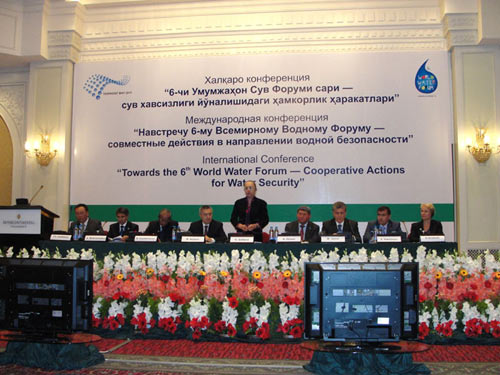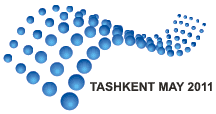INTERNATIONAL CONFERENCE “TOWARDS THE 6TH WORLD WATER FORUM – JOINT ACTION TOWARDS WATER SECURITY”
The International conference “Towards the 6th World Water Forum – joint action towards water security” opened in Tashkent on 12 May. It is supported by the World Water Council in the framework of the global process of preparation to the forthcoming forum, to take place in March 2012 in Marseille (France).

The international conference in Tashkent, which is an important step in preparation for the World Water Forum, is being attended by over 400 experts, prominent scientists, environmentalists and specialists in water management from 32 countries, as well as representatives of about 30 influential international organizations and financial institutions, including the UN and its member agencies, the World Water Council, Global Water Partnership, World Bank, Asian Development Bank, Economic Commission for Europe, International Fund for Saving the Aral Sea, USAID, International Commission on Irrigation and Drainage, International Commission on Large Dams, and others.

It was noted that the water in Central Asia for centuries was the most important resource, the source of life, the basis for development and prosperity for all peoples of the region. However, the reckless economic activity in the second half of the twentieth century led to disastrous results, primarily to the Aral Sea shrinking and the depletion of water resources of two main rivers of the region - the Amu Darya and Syr Darya. Negative impact of environmental catastrophe in the Priaralie today keenly felt not only by all the countries of Central Asia, but also has global implications.
The discussed issues at the conference have been included in the agenda of the 6th World Water Forum, of which theme is "From the goal to solutions". Within the conference the round table was conducted for each of the seven priorities that reflect the current tasks for the Central Asian region in the water resources conservation and utilization spheres.
During the open meaningful dialog the participants comprehensively have discussed the regional issues on the secure and sustainable water supply for all spheres of human activity and the environment in view of climate change and the adverse consequences of anthropogenic impact on the watershed between the Amu Darya and Syr Darya rivers.
The final document based on the conference discussions was adopted . It noted that the participants came to agreement about the highest priorities of the 6th World Water Forum Agenda for our region.
(information from UzA)
FINAL RESOLUTION OF THE INTERNATIONAL CONFERENCE “TOWARDS THE 6TH WORLD WATER FORUM — COOPERATIVE ACTIONS FOR WATER SECURITY”

Within the framework of preparatory process to the 6th World Water Forum and based on key thematic priorities set by the World Water Council and the UN Millennium Declaration, the participants of the Conference have discussed in detail the regional issues of guaranteed and sustainable water supply to all spheres of human activity and to environment, with consideration of climate changes and negative consequences of anthropogenic impact on the basin in the interstream of Amudarya and Syrdarya. Taking into account this discussion, participants of the Conference make the following statement:
1. The Conference acknowledged the pricelessness of water as the nature’ gift. In Central Asia, water resources are of especial importance for securing sustainable development in the region, food security, environmental safety and people’s health, and, as a whole, for achievement of the Millennium Development Goals.
2. The Conference’s outcomes confirm a need to strengthen international and regional cooperation on transboundary watercourses in the region. Given the current high climatic risks, only such cooperation, which is founded on equal access to transboundary water resources and rational water use, may serve as a basis for sustainable socio-economic development, environmental safety, and stability in the region.
3. In this context, particular attention should be paid to observance by the region’s states of international law norms, including the Conventions on Protection and Use of Transboundary Watercourses and Lakes (1992) and on the Law of Non-Navigational Uses of International Watercourses (1997). Given the global challenges related to climate change and predicted steady demographic growth, irrational water use may cause irreversible damage to all riparian states.
4. The Conference participants pay special attention to a need for improvement of efficiency of water use by the region’s states for people’s needs (guaranteed access to water for all and the right to water), agricultural needs (reduction of losses in irrigation networks, implementation of water distribution and accounting systems, and application of alternative and water-saving agronomic technologies), and for ensuring environmental safety (reduction of anthropogenic risks casing pollution of water resources and disturbance of fragile ecological balance).
5. The Conference participants have agreed on the following most priority issues of the regional agenda for the 6th World Water Forum:
I. Adoption and steadfast implementation by all states in the region of international water law norms and principles, according to which transboundary river water in the territory of any state should be used in such a way so that not to do harm to other riparian states, whereas construction of hydraulic structures on transboundary rivers may be undertaken only provided that the findings of independent international expertise are positive and with consent of downstream states. There is a need to enhance activities of international institutions in part of engagement of those region’s states that have not joined the International Conventions yet.
II. Strengthening of cooperation among the states in area of rational water use in the region in order to improve efficiency of joint management and use of transboundary waters and water-management infrastructure, raise sustainability of water supply and adopt innovation technologies. Disseminate widely positive experience in reduction of water wastage in agriculture through implementation of integrated water resources management (IWRM), improvement and reconstruction of irrigation systems.
III. Ensure reliable flow regime of transboundary rivers for normal life sustenance in the region and meeting of drinking and agricultural needs.
IV. Ensure food security of the region’s states through sustainability of irrigated farming and sufficient water availability during growing seasons.
6. The Conference participants call upon the international community and participants of the 6th World Water Forum to contribute to promotion of the principles of sustainable growth and ecological balance maintenance on the basis of the proposed regional agenda.
|